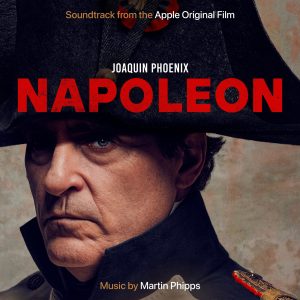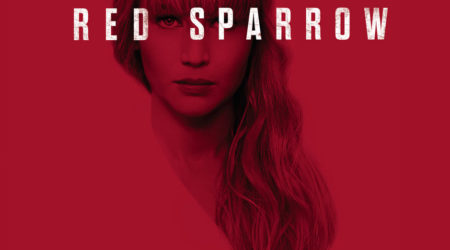
Many iconic movies have been directed by Ridley Scott. Examples are Alien, The Gladiator and Blade Runner, to name just a few. While he has built relationships with certain composers like Hans Zimmer and Harry Gregson-Williams, he has also worked with many other composers to find the right sounds for a particular movie. For his latest movie, Napoleon, he gave the assignment to Martin Phipps for the first time, after hearing the music for the successful TV show The Crown.
The music for Napoleon was different from what I expected when I started to listen to the soundtrack album. As it happens, my image did not match what I had seen in the film’s trailers. In those trailers, the epic battle scenes stand out, bringing me right back to the music Hans Zimmer wrote for The Gladiator, and the music I heard on the Napoleon album was everything but that. What was also a surprise for me was the length of the album, with only 48 minutes of music for a more than two and a half hours film, and while watching the movie, it started to make sense.
The movie contains many important battles of Napoleon but is not the film’s primary focus. Instead, it focuses more on the man underneath the uniform, especially regarding his relationship with his first wife, Josephine. As a result, the music is more emotional than the bold orchestral sounds I was expecting. There are two reasons why so little music is present on the album for such a lengthy movie. The first reason is that there is a lot of other already existing music to be heard in the film. Some of them are from Napoleon’s era, like music from Haydn, but others are surprisingly modern, while they still sound like they are from the same period. One is the gorgeous piano piece “Dawn” from the movie Pride and Prejudice, written by Dario Marianelli. Another cue is Phipps’ own work, “Charge,” from the BBC series War & Peace, which is quite a haunting choir piece. After discussing Phipps ‘ original material in this review, I will go into more detail about the second reason why the album is so short.
For a movie that contains a lot of already existing music, and since Napoleon has many dramatic moments with dialogue, there is less need for original music. Of course, original material is still required to fill in the gaps. Not only does the music, which Phipps wrote for the film, reflect the music that could be heard in that era, but there is also an original instrument used from that period. This aspect can be heard in the first track, “Napoleon’s Piano,” in which you can listen to a melody performed on a not-so-traditional piano. According to Phipps in an interview, this piano was owned by Napoleon back in the day and resides in a museum near London, where it was allowed to be used for the film. The melody of this theme returns in “Ladies In Waiting.”
The piano track can be seen as Napoleon’s theme, representing him as a man who is a bit of an outcast. The theme for Josephine is different, and his love interest is presented with a gorgeous waltz, as can be heard in “Josephine.” Another fantastic theme is for Napoleon’s soldiers, found in the track “Soldiers of the 5th Regiment,” represented by remarkable humming voices. In addition to these themes, most tracks on the album contain something extraordinary, like beautiful melodies performed by an orchestra or a smaller set of instruments, and many of them have a beautiful synergy with the human voice. “Make the Rain Stop,” for example, contains an elegant melody on a violin before a choir takes over the melody line. The best examples of the voice are the tracks created in collaboration with Ensemble Organum. “Austerlitz Kyrie” is a superb version of a “Kyrie Eleison” song, which they perform. In “Downfall,” you can hear how they use the same melody again accompanied by fast patterns. This piece was heard in one of the battles and can serve as an example of the kind of music you can expect from Phipps for these kinds of scenes.
The movie and the album end with the track “Bonaparte’s Lament,” a cue sung by Ensemble Spartimu. They are singers from Corsica, where Napoleon Bonaparte was born as well. A kind and perceptive person on Facebook pointed me to the opening scene of the 2003 movie Monsieur N., which also used Corsican singers during a scene of Napoleon being on St. Helena island. Apparently, the combination of those singers and Napoleon works very well.
Watching the movie and listening to the music at the same time was very exciting to me. The reason for it, now coming to the second reason I still needed to mention, is that all the music I heard was like standalone pieces that could be applied to one or more specific scenes in the film, which has happened. I haven’t experienced that lately for a recent film. Not only did I hear some of the themes Phipps created for the movie multiple times, but Marianelli’s “Dawn” was used twice as well, and I am pretty conflicted about this idea. I think all the music works in the Napoleon, both the original and existing materials, but I was not that familiar with “Charge” and “Dawn” to begin with, to associate these pieces with other media. As a film music enthusiast, though, I also believe that a composer can write something better for a specific scene than an existing piece would since it is explicitly written for a character, story, or scene, which an existing piece is not. Looking specifically at the music that Martin Phipps has written, it is very well executed. It captures Napoleon as a person very well, which is the essence of this movie. Ridley Scott made a good choice on that front.
Listen or buy
- Buy this soundtrack digitally from Amazon.com or Apple Music
- Listen to this soundtrack on Spotify
Tracklist
The highlights are in bold.
- Napoleon’s Piano (2:13)
- Toulon (3:25)
- Josephine (3:08)
- Soldiers of the 5th Regiment (4:22)
- Ladies in Waiting (1:52)
- Austerlitz Kyrie (2:55)
- We are Discovered (6:04)
- Make the Rain Stop (2:07)
- Look Down (1:58)
- First Counsel (2:47)
- Russia (4:14)
- Return to France (1:47)
- Waterloo Requiem (4:24)
- Downfall (3:32)
- Bonaparte’s Lament (2:43)
Total length: 47 minutes
Milan (2023)




